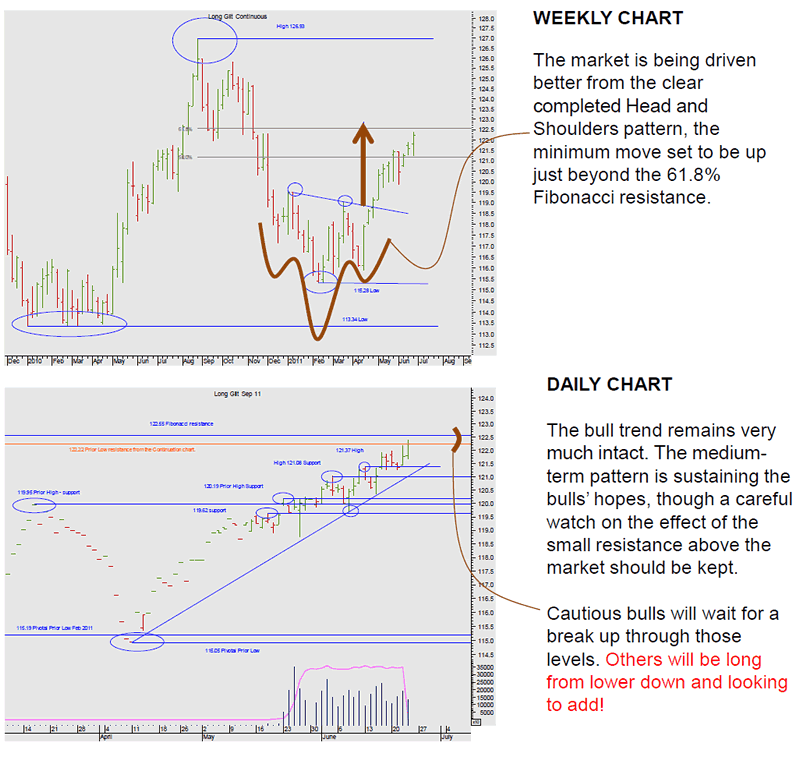UK Government Bonds, Gilts Rally on Hint of More Q.E.
Interest-Rates / UK Debt Jun 24, 2011 - 07:18 AM GMTBy: Seven_Days_Ahead
 The rally in government bond markets over recent months has been driven by two anxieties:
The rally in government bond markets over recent months has been driven by two anxieties:
1.The health of the global economic recovery, and
2.The Euro zone Sovereign debt crisis.

FUNDAMENTALS:
The rally in government bond markets over recent months has been driven by two anxieties:
1.The health of the global economic recovery, and
2.The Euro zone Sovereign debt crisis.
In the US, the economy has been slowing for several months despite the Fed’s QE2 program which worryingly draws to a close at the end of this month. The Fed acknowledges the weakness but so far hasn’t proposed any new measures designed to reverse the slowdown due to fears of gradually accelerating inflation.
In China, the authorities have tightened monetary policy on several occasions as they try to contain inflation and prevent an asset bubble from developing in an economy that has invested heavily in manufacturing capacity designed to fuel export-led growth.
In the Euro zone the recovery continues to be propelled by fast-growing Germany. But strip out German growth and the picture looks very different, with weaker peripheral economies struggling to cope with the burden of public debt and austerity measures designed to bring public finances back under control. But despite this, Greece and a few others remain in intensive care with default, at least in Greece looking like a real possibility.
IN the UK the coalition government has put into place deep spending cuts designed to bring public finances back to controllable levels that don’t hinder private sector growth, but the short/medium term consequences are slower growth, maybe even recession?
Over the last 1–2 years the Bank of England has walked a policy tightrope that this year has become ever more demanding.
As the austerity measures have begun to bite, the economy has rapidly cooled with the most recent retail sales report coming in at -1.6% month on month. This is bad news for a service sector led economy.
The Bank until recently had been widely expected to begin tightening policy later this year in an attempt to gradually return CPI inflation to its target of 2.0% from the current and persistent overshoot of 4.5%.
Indeed, the committee had for several months been split over how to respond to the dichotomy facing the economy. Six members had consistently voted for policy to remain on hold, but with various caveats about growth and inflation, the other three had voted for an immediate rate hike, with one seeking 50bp.
As if that wasn’t enough of a split, one of the group of six wanted to increase the QE program from its current level of £200.0B, but was constantly out-voted. This week the Bank of England released the MPC minutes for the meeting held earlier this month and there was a clear change of tone.
Although inflation remains substantially above targets, policy makers are becoming increasingly concerned about growth which looks set to slow further over the coming months.
The Government has little choice but to see through its fiscal retrenchment or else risk a debt crisis similar to the one playing out in the Euro zone.
So fiscal policy isn’t an option. The Bank of England can not cut interest rates since they are already at 0.25% where they have been for about two years. The only option open is to restart QE and that seems to be the direction policy makers are heading.
If the economy does slow further as feared, the thinking is that inflation will correct substantially lower. Interest rate hikes will be unnecessary. But then deflation could conceivably become a risk once more.
The Bank then would have to start buying bonds once more and it is the prospect of the QE policy being re-activated that has begun to drive gilt yields lower and send Gilt futures higher.
We judge the Bank is more likely than not going to restart QE and the Gilt will enjoy the support restarting that program will offer, together with the support traditionally offered bonds from slower growth and declining inflation.
In short, the gilt rally seems far from over.
Mark Sturdy
John Lewis
Seven Days Ahead
Be sure to sign up for and receive these articles automatically at Market Updates
Mark Sturdy, John Lewis & Philip Allwright, write exclusively for Seven Days Ahead a regulated financial advisor selling professional-level technical and macro analysis and high-performing trade recommendations with detailed risk control for banks, hedge funds, and expert private investors around the world. Check out our subscriptions.
© 2011 Copyright Seven Days Ahead - All Rights Reserved
Disclaimer: The above is a matter of opinion provided for general information purposes only and is not intended as investment advice. Information and analysis above are derived from sources and utilising methods believed to be reliable, but we cannot accept responsibility for any losses you may incur as a result of this analysis. Individuals should consult with their personal financial advisors.
Seven Days Ahead Archive |
© 2005-2022 http://www.MarketOracle.co.uk - The Market Oracle is a FREE Daily Financial Markets Analysis & Forecasting online publication.



